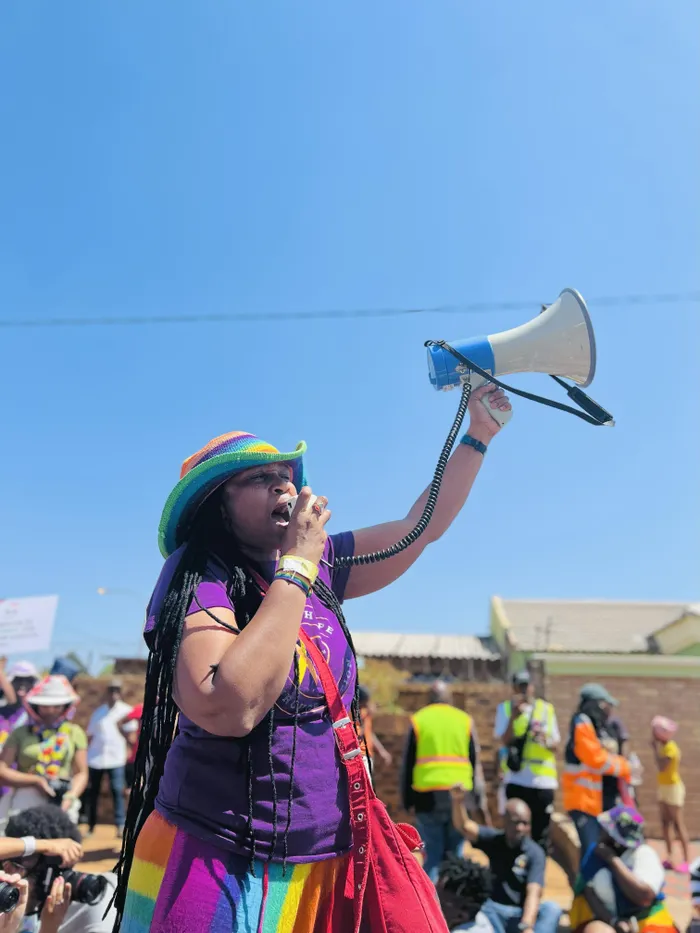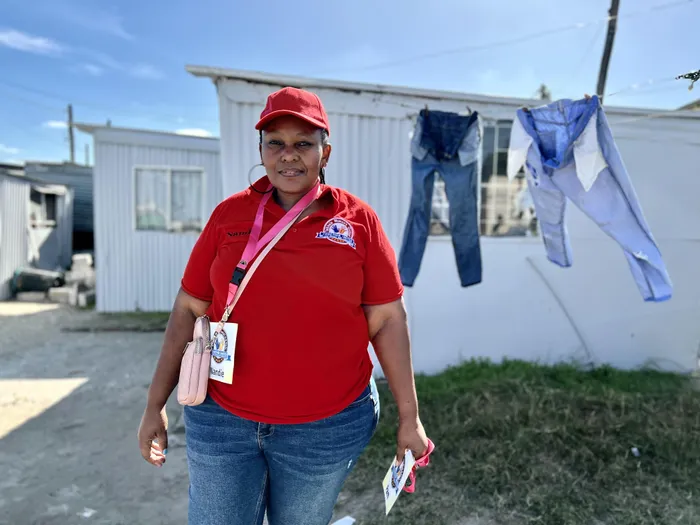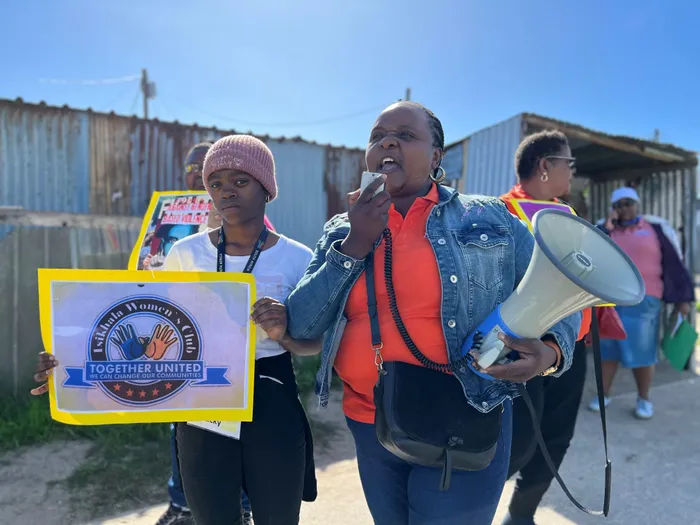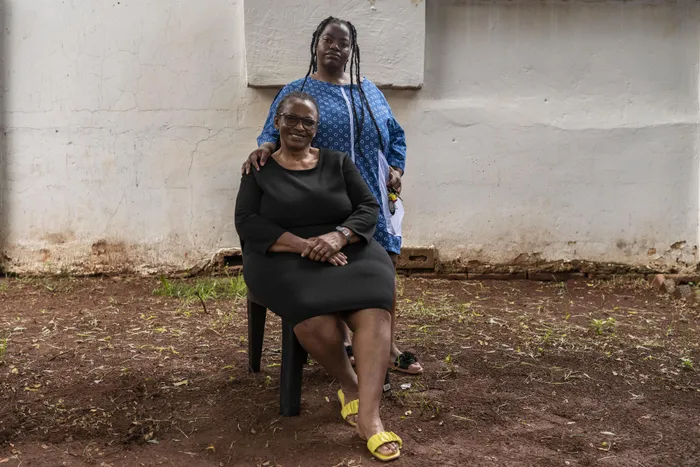'Our children, our fight': Parents lead push against queerphobia in SA

Virginia Magwaza, head of Parents, Families and Friends of South African Queers, addressing faith leaders and families of LGBTQIA+ persons.
Image: Carl Collison for Arcus Foundation
Despite its progressive queer-inclusive Constitution, South Africa is a country still riddled with high rates of anti-LGBTQIA+ violence. Three organisations, headed by parents, believe that getting other parents to accept their queer children is an important tool in pushing back against queerphobia - and they are taking their fight to the streets.
Making its way through the streets of Khayelitsha, a small group of about a dozen women attracted the stares of curious onlookers as they took turns addressing the community through a temperamental loudhailer.
“Senzenzi na … What have we done that we deserve to be killed?” one trumpeted. Later, another declared: “Gays and lesbians are born like that, so we need to accept them as they are… If you don’t accept your child, they won’t be accepted out there.”
The women belong to an organisation called Isikhala Women’s Group. The march through Khayelitsha was part of the organisation’s activities aimed at reducing sexual and gender-based violence and getting parents of LGBTQIA+ people to love and accept their queer offspring.
One of the women in the procession was Martha Mashifane, a Johannesburg resident visiting Khayelitsha for the first time - the sprawling township on the Cape Flats known for its high rate of violent queerphobic attacks.

Khayelitsha activist and mother, Nandipha Jovuka, continues to fight for parental acceptance of queer youth - both in her community and her own family.
Image: Carl Collison
A few days after the campaign, Mashifane laughs: “During that walk, I just held my breath. I was scared! That day I said, ‘Oh my God, I can't believe we did this.’ You know, there is something about Xhosa women. Xhosa women can be brave. So brave. And for places like that, you need to have Xhosa women to walk around and to mobilise people.”
Nandipha Jovuka, a long-standing member of Isikhala Women’s Group, shrugged this off, with a smile. “No, I was not scared. It’s my kasi (’hood) and we are used to doing all these events,” she says.
Jovuka did, however, concede that “there are areas that we can’t go to, like Philippi, Site C, Lower Crossroads. We are scared of those places, because there's no day or night there.”
For Jovuka, the threat of violence is not the toughest part of her activism.
“The most difficult thing about (this) is when you have to prepare an event or campaign. Because you need to have women that are strong - and who are not scared.”
The mother of a 20-year-old gay man, Jovuka, said that her son’s sexual orientation has seen no pushback in their community “at all”.
“They love him so much,” she said.
It is, however, closer to home where Jovuka and her son experience the most discrimination.
“Some members of the family - my brothers - always push for him to play soccer. They say, ‘this moffie (faggot), this moffie’... and I always say, ‘This is my moffie; leave my child alone.’ So… It’s not easy. It’s not easy, even now.”

Members of Isitha Women’s Organisation, PFSAQ, and Turning Tides join forces to push back against queerphobia in homes and communities.
Image: Carl Collison
Witnessing first-hand the effects of anti-queer discrimination within families is, largely, the reason for Jovuka’s activism.
In August 2023, a few months after the campaign through the streets of Khayelitsha, Jovuka launched her own NGO, Isitha Women’s Organisation.
“Our aim is to get parents to love and care for their children - and to respect their choice. There is nothing wrong with them. We must just love them as our children,” she said.
A day before the 2023 Soweto Pride march, an Interfaith Dialogue was held at the Diepkloof Wellness Centre. In attendance were faith leaders, some queer folk and a smattering of queer rights activists. The hall was, however, mostly populated by mothers, grandmothers and family members of LGBTQIA+ folk.
As a precursor to the dialogue, Virginia Magwaza conducted a brief sexual orientation, gender identity, gender expression and sex characteristics (SOGIESC) training session.

Founder of Turning Tides, Msezane offers shelter and hope to queer South Africans shunned by their families.
Image: Carl Collison
Magwaza is the managing director of Parents, Families and Friends of South African Queers (PFSAQ), an organisation she founded 10 years ago when she realised the need to get the families and friends of queer persons to understand, love and support them.
“I got a call from someone saying (their) friend's brother had killed himself, and (had) left a message saying they could no longer live the way they were forced to live. We contacted the family to provide some comfort and support, but the family was, like, ‘We don't even want to hear about you guys … We don't even want to hear the word ‘gay’.’ So that's when I thought there's a need for us to mobilise family. There's a need for us to provide information for the families. There's a need for us to have a core group of parents that can talk to them,” says Magwaza, who identifies as gender-nonconforming and has three children.
Having started its work in Gauteng, the organisation now works nationally and has, to date, engaged with “hundreds” of parents.
While Magwaza is clearly proud of the work PFSAQ has achieved to date, they sigh as they say: “I must just say to you that this work is hard. Parents and families are not going to just leave what they are doing to come in and listen to you saying ‘your children are gay and you have to live with it’, right? So we have to employ some strategies that will allow parents to see the light, bit by bit.”
One of the strategies employed by the organisation is forming partnerships with civil society organisations “that are non-LGBTI aligned”.
Thabisile Msezane is the founder of Turning Tides, which, when it opened its doors in 2022, was one of only two shelters in South Africa specifically for destitute queer persons. Msezane established the much-needed facility as part of the work done by Lerato la Basadi, an organisation she established, made up of church women who travel the country – “wherever we are asked to assist” – to conscientise and support parents of queer children.
In 2012, in response to a spate of violent queerphobic crimes (“The killings were not stopping. It was one case after another.”), Msezane and other church women would travel to various parts of the country to both assist and comfort families who had lost loved ones to queerphobic attacks and also attend the court hearings of those accused of having committed the crimes.
An important part of Lerato la Basadi’s work is providing assistance to such families who, in their time of need, are not supported by their communities.
“Because, you know, it's not somebody's child, but it's a lesbian that has died. It's not somebody's child, but it's a gay person that has died. So you know, the neighbours sit back - unlike with any other funeral. But we showed up. Even if it's far away, we showed up,” she said.
The women would also regularly travel to hotspots of queerphobic violence to conduct workshops and host prayer sessions with those communities - “especially church women within those communities”.
Aside from only a few exceptions, all three of these organisations work almost exclusively with women.
For Magwaza, this is largely due to “issues of intersectionality”.
“At one of our meetings, a parent once said: ‘When our children come out of the closet, we then get into the closet’. So, we find that a child comes out to their mother and the mother now goes into the closet on behalf of this child, because she is trying to avoid a situation where the father would say ‘it is your fault’.”
Magwaza said that this would then often lead to domestic violence. This, Magwaza added, is why mothers who know of their children’s sexual orientation or gender identity would say “‘we have to be in the closet (because of) our husbands, our own families, our neighbours, our community, our churches’.”
Despite the numerous challenges, and the slow pace at which concrete positive results are yielded, these organisations forge ahead with dogged determination.
“I always tell my team just one parent is a huge win,” Magwaza said.
Msezane lets out an exasperated sigh as she said: “You know, I'm turning 70 this year. Ever since I was young, there have always been, in families, and in my family, somebody who was gay or lesbian - and it was normal. They were never killed. So, the narrative that this is a Western thing that they're bringing to Africa, it's not true… So yes, (we) need to raise awareness, to conscientise, to actually assist, because some of the families are ignorant or (face) pressure from their religious or traditional beliefs. But once you sit down with them and explain to them: ‘Look, this is your child. If you say your child is a gift from God, you don't choose a gift. God has given you this child - to raise, to love and to cherish.”
On a November night in 2023 - just over seven months after participating in the street campaign through Khayelitsha - Jovuka was in Johannesburg, swapping her usual in-the-trenches takkies, T-shirt and jeans for a completely different look: a glamorous floor-length evening gown.
It is the night of the annual Feather Awards ceremony and she, along with fellow parent activists, Zodwa Rannyadi and Abraham Sebidi, have clinched the Best Rainbow Parenting Award.
“Winning that award is not just for me,” Jovuka said. “It represents recognition given to parents standing together in support of the rights and dignity of our kids in the (LGBTQIA+) community… I don’t know how much we can change in our communities, but we are going to try as parents to do what we can do. Because these children, they need love. They need the love of their parents.”
- Originally published on Beyond the Margins, a platform that showcases underrepresented voices and perspectives through art, writing, and storytelling.
Related Topics: